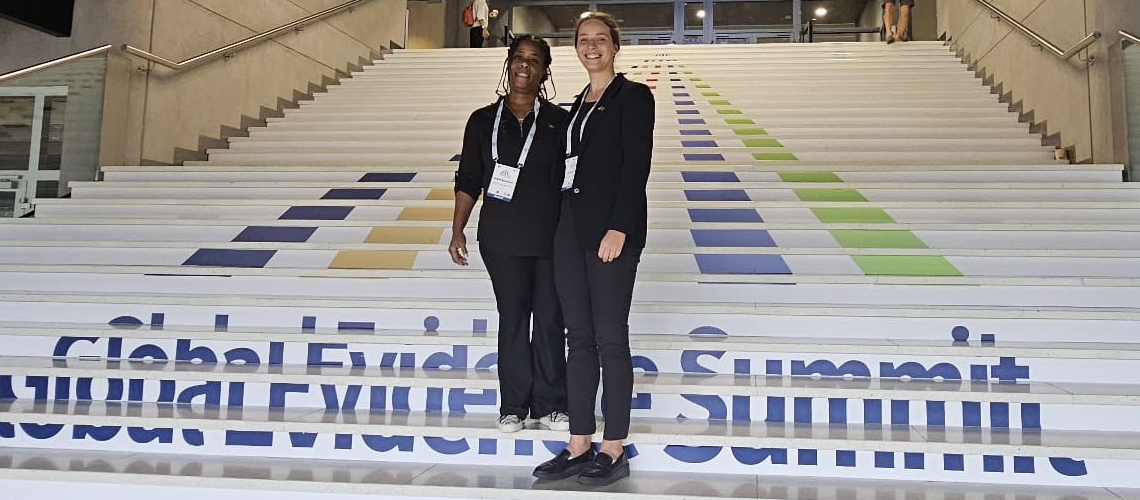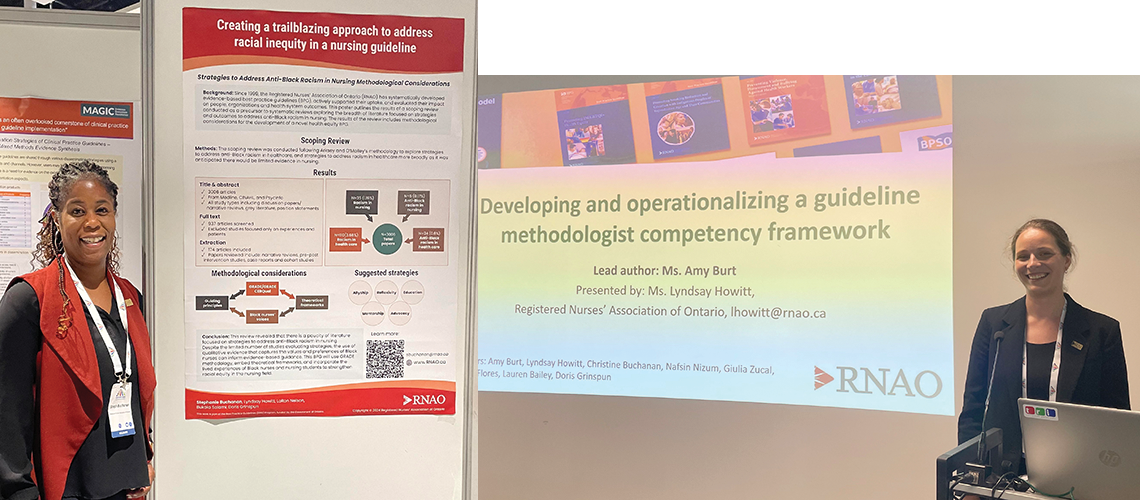
Bringing RNAO’s outstanding best practice guideline (BPG) work to the second annual Global Evidence Summit in Prague this past September was a tremendous honour.
The journey to the summit was a powerful learning experience. RNAO’s guideline development and research team submitted four abstracts for consideration and were excited to have all four accepted. This included three poster presentations that would highlight RNAO's work in three areas: BPG development methods; a systematic review conducted to inform the development of the next edition preventing falls and reducing injury from falls BPG; and a scoping review to inform RNAO’s upcoming BPG focused on addressing anti-Black racism in nursing. Our fourth presentation – delivered to a room of researchers from around the world – allowed us to highlight the unique role RNAO has created (guideline development methodologist) that allows nurses to lead the development of BPGs.
As we planned for this event, we had to consider the usual practical aspects, such as travel, geographical distance and a new time zone, and time away from our usual work. It was critical for us to ensure representation – in the way of a presenter – from the Black community for our presentation focusing on addressing anti-Black racism in nursing. After many meetings and thoughtful discussions – and the unwavering support of the BPG co-chairs Dr. LaRon Nelson and Dr. Bukola Salami – I (Buchanan) agreed to be that voice, and we were on our way to Prague to present RNAO’s work.
From day one, it was evident the summit was going to be a powerhouse multicultural event. Attendees included academics from many disciplines, researchers and policymakers from across the globe. The shared passion for evidence-based practice, health care and science was evident from the start. Upon arrival, the enormity of the venue – O2 Universum arena, which easily held 3,000+ attendees from all walks of life – was astounding.
Sir Jeremy Farrar, chief scientist at the World Health Organization, set the tone for the event during the opening plenary. He talked about some of the challenges we face achieving the United Nations’ goals for peace and prosperity (known as the Sustainable Development Goals). These include tackling poverty, gender inequality and threats to our environment – all areas of dedicated advocacy by RNAO. Farrar also emphasized that we are currently experiencing a scientific golden age marked by rapid advances in technology, such as artificial intelligence (AI). We are navigating this while also facing significant challenges globally around scientific mistrust and the spread of misinformation. He urged us to be persistent in addressing these challenges as a global community.
These early impressions reflected the goal of the summit: to provide a multidisciplinary and cross-cultural platform for delegates and speakers to exchange ideas about how best to (1) produce, summarize and disseminate evidence to inform policy and practice, and (2) use that evidence to improve people's lives around the world.
One of the first memorable one-to-one conversations I (Buchanan) had was with a representative from the Pan-African Collective for Evidence in South Africa. During a visit to their exhibit, this individual remarked passionately that they "...have many student placements from McMaster University in Canada at our organization." I shared that RNAO also has many student placements from McMaster and the co-chair of our International Advisory Council, Dr. John Lavis, is a professor from McMaster. This was an example of the interconnectedness of our work across continents, and the partnerships that must continue if we are to realize global change.
Although we could not explore the whole city, an interesting contrast emerged between the historic and visually breathtaking, culturally homogenous city of Prague and the diverse, multicultural, passionate group of delegates attending the conference. The week-long summit represented a “community” of visitors with a shared vision of what the world could and should become, where research benefits everyone quickly and inequalities do not exist.
Plenaries, workshops and oral presentations focused on: AI for evidence synthesis; research methods; health policy; and knowledge translation. Many talks integrated the theme of social justice.
Dr. David Williams, a professor of public health and African American studies at Harvard University, spoke convincingly about his research on the ways race, socioeconomic status, stress, racism and health behaviours affect health outcomes. Dr. Patrick Okwen, a physician and researcher, spoke passionately of his dedication to storytelling as a means of communicating research to communities in Africa.
We were able to share RNAO’s novel health equity work, including our focused attention and published equity guidelines on 2SLGBTQI+ health equity (2021), Indigenous health (2022) and Black nurses (in-progress). We were reassured that the approaches we have learned at RNAO from members of each of these communities has been invaluable.
Overall, the feedback we received about our presentations was positive. Attendees were impressed by RNAO’s integrated approach to guideline development, implementation and evaluation (read more about this in Research community applauds RNAO). The poster presentation that focused on the unique approach we are taking to develop the BPG about anti-Black racism in nursing also received excellent feedback from attendees.
The summit highlighted for us that there is a passion and appreciation for evidence-based practice with a greater focus on health equity globally. Health inequities continue to exist in health-care systems around the world, which has an impact on the way we conduct, translate, disseminate, utilize and evaluate research.
Like RNAO, many organizations are focused on understanding how and where equity is incorporated into research, policy and guidelines. Yet, it was clear that RNAO has taken health equity a step further by focusing on the development of its 2SLGBTQI+ Health Equity BPG, the first-ever Indigenous-focused BPG on prenatal smoking cessation, and the BPG in development about anti-Black racism in the nursing profession.
Attending the summit illuminated that RNAO is a leader in addressing the urgent call to eradicate health inequities, foster inclusive workplaces and improve patient outcomes. For that and more, we were proud to represent our association at such an important global evidence summit.


